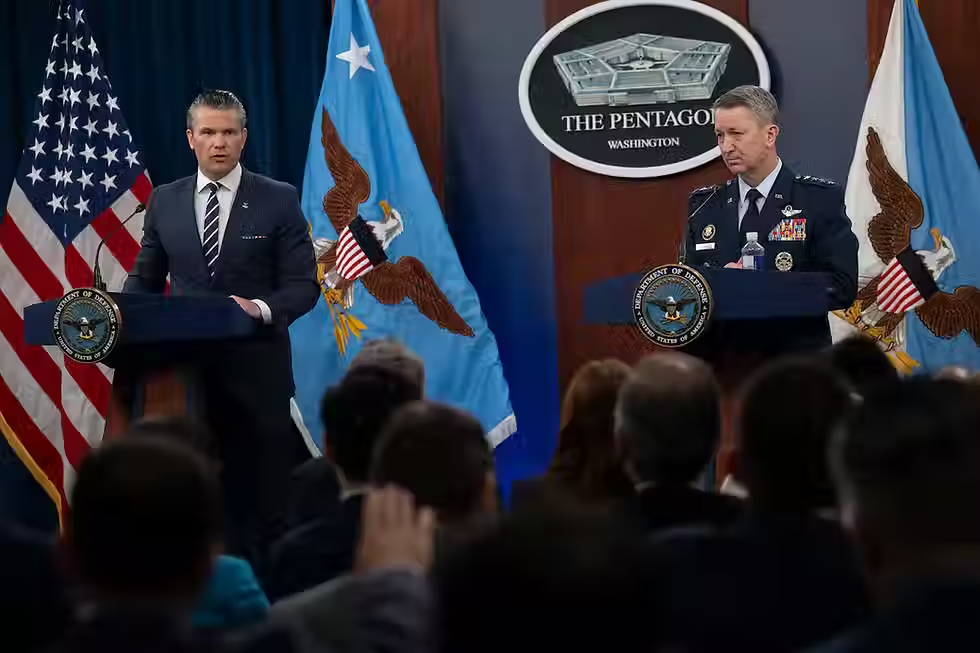American Leadership Matters When the Stakes Are This High
- CME Press Room

- Jul 3, 2025
- 3 min read
Updated: Aug 26, 2025
by State Sen. Jay Collins and Amber Smith, CME Military Liaison | Published July 3, 2025

Defense Secretary Pete Hegseth and Air Force General Dan Caine, 6/26/25, DOD News
Recently, the United States launched strategic strikes against three of Iran’s nuclear facilities, an operation that significantly damaged the regime’s ability to develop a nuclear weapon. As military veterans who’ve served on the front lines of our nation’s battles, we don’t take lightly what it means to project American power abroad. Nor do we take for granted what it takes to make the kinds of difficult decisions that put American lives in harm’s way.
That’s why what we’re witnessing now in the Middle East is a reminder of how high the stakes are when it comes to leadership in the White House. Whether in the skies over Iraq or the mountains of Afghanistan, both of us have firsthand experience with decisions being made under pressure. And we’ve seen what happens when those decisions are delayed, politically motivated, or made by those unfit for command.
Let’s be clear: America cannot afford politics as usual in times of international crisis. These moments don’t care about press conferences or approval ratings. They demand seasoned, steady, and strategic leadership. And merit, not political favoritism, must always be the benchmark when it comes to national security decision-making.
Look no further than the disastrous withdrawal from Afghanistan under the previous administration. That debacle wasn’t just poor planning. It was a failure of leadership at the highest level. Accountability still hasn’t come for those responsible. Thirteen brave Americans died. Our allies were abandoned, and all because politics took priority over reality.
Now contrast that with what just happened with Iran: a clear, calculated decision to degrade a hostile regime’s nuclear capabilities, carried out with precision and resolve. It wasn’t done for a poll bump or a photo op. It was done because it was necessary. And because we have a commander-in-chief who can comprehend the threat, trust his team, and execute. We can’t afford to have Iran, the leading state sponsor of terrorism, loaded with nuclear weapons, plain and simple.
Can you imagine what this would’ve looked like if Kamala Harris had won the presidency? It’s a terrifying thought. Imagine a White House consumed by identity checklists and social media optics trying to handle the Iranian threat. The kind of leadership that left Americans clinging to airplanes in Kabul wouldn’t have had the resolve to stop Iran from developing nuclear weapons.
This is where we give credit where it’s due: the Trump administration understood that peace is kept through strength. It laid the groundwork for a foreign policy that centered American interests, rebuilt deterrence, and prioritized the warfighter over the bureaucrat. The current administration, now under new leadership, is proving that coherence matters. When a president is actually present, listening, and thinking clearly, we see the difference on the world stage.
That doesn’t mean we’re out of danger. Iran, like other adversaries, only respects force. What matters now is follow-through and the courage to make decisions based on merit and reality, not media narratives or DC groupthink.
Both of us have worn the uniform. We know what it means to face real consequences when leadership fails. In war, bad calls get people killed. In policy, they can cost nations everything.
This is why we need leaders, military and civilian, who understand the weight of command. It’s why we need people who have earned their place at the table, not been handed it because of political convenience or ideological fashion. And it's why we believe America is stronger today than it was just a few years ago, not because the threats have disappeared, but because real leadership has reemerged.
We’ve served under strong leaders and weak ones. We know the difference. And when the next global challenge comes—and it will—America must be led by those who put mission over ego, and reality over rhetoric.
Jay Collins represents Florida’s 14th District in the State Senate and is a highly-decorated Army Special Forces combat veteran and Purple Heart recipient with over two decades of service.
Amber Smith, a spokesperson for the Coalition for Military Excellence, is a former U.S. Army combat helicopter pilot and former Deputy Assistant to the Secretary of Defense.
The Coalition for Military Excellence (CME) is a national organization dedicated to advocating for veterans and military excellence in the U.S. armed forces. CME is committed to combating policies and practices that undermine military excellence and threaten veteran support services. CME’s mission is to ensure the United States military remains focused on our nation's security through merit, strength, and excellence, while advocating for veteran rights, benefits, and resources.
###
CME has a roster of experienced, veteran and military ambassadors available for comment or interview. If you're interested in getting their unique perspectives for your coverage, please email inquiries@militaryexcellence.org.









Comments